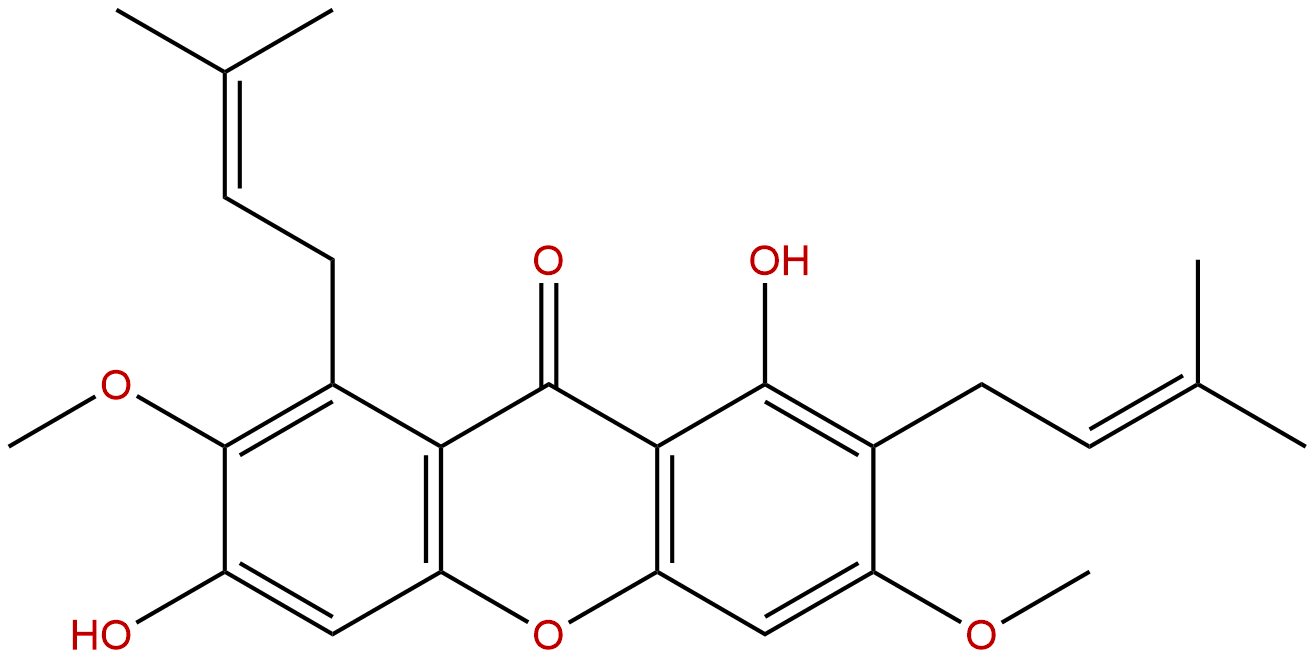
Beta-mangostinCAS No.:20931-37-7
|
||||||||||
 |
|
|
||||||||

| Catalogue No.: | BP0268 |
| Formula: | C25H28O6 |
| Mol Weight: | 424.493 |
Synonym name:
Catalogue No.: BP0268
Cas No.: 20931-37-7
Formula: C25H28O6
Mol Weight: 424.493
Botanical Source: From Garcinia mangostana (mangosteen) and Cratoxylum formosum ssp. pruniforum
Purity: 95%~99%
Analysis Method: HPLC-DAD or/and HPLC-ELSD
Identification Method: Mass, NMR
Packing: Brown vial or HDPE plastic bottle
Can be supplied from milligrams to grams.
For Reference Standard and R&D, Not for Human Use Directly.
Inquire for bulk scale.
Description:
Beta-mangostin has cytotoxic, and anti-inflammatory effects, it exhibits strong antibacterial activity against B. cereus, and Mycobacterium tuberculosis with the MIC value of 0.25, and 6.25 microg/ml, respectively. It also shows antimalarial activity against Plasmodium falciparum with IC(50) values of 7.2 microg/ml.
References:
J Ethnopharmacol. 2014 Apr 28;153(2):435-45.
β Mangostin suppress LPS-induced inflammatory response in RAW 264.7 macrophages in vitro and carrageenan-induced peritonitis in vivo.
The fruit hull of Garcinia mangostana Linn. has been used in traditional medicine for treatment of various inflammatory diseases. Hence, this study aims to investigate the in vitro and in vivo anti-inflammatory effect of β mangostin (βM), a major compound present in Garcinia mangostana.
METHODS AND RESULTS:
The in silico analysis of inflammatory mediators such as cyclooxygenase (COX) and nuclear factor-kappa B (NF-kB) were performed via molecular docking. Further evaluation of anti-inflammatory effect was conducted in lipopolysaccharide (LPS) induced RAW 264.7 macrophages. Suppression of activated NF-kB was analyzed by high content screening. βM triggered inhibition of COX-1 and COX-2 in vitro were studied using biochemical kit. The in vivo model used in this study was carrageenan-induced peritonitis model, where reduction in carrageenan-induced peritonitis is measured by leukocyte migration and vascular permeability. In addition, the evaluation of βM׳s effect on carrageenan induced TNF-α and IL-1β release on peritoneal fluid was also carried out. Treatment with βM could inhibit the LPS-induced NO production but not the viability of RAW 264.7. Similarly, βM inhibited PGE2 production and the cytokines: TNF-α and IL-6. The COX catalyzed prostaglandin biosynthesis assay had showed selective COX-2 inhibition with a 53.0±6.01% inhibition at 20 μg/ml. Apart from this, βM was capable in repressing translocation of NF-kB into the nucleus. These results were concurrent with molecular docking which revealed COX-2 selectivity and NF-kB inhibition. The in vivo analysis showed that after four hours of peritonitis, βM was unable to reduce vascular permeability, yet could decrease the total leukocyte migration; particularly, neutrophils. Meanwhile, dexamethasone 0.5 mg/kg, successfully reduced vascular permeability. The levels of TNF-α and IL-1β in peritoneal fluid was reduced significantly by βM treatment.
CONCLUSIONS:
The current study supports the traditional use of Garcinia mangostana fruit hull for treatment of inflammatory conditions. In addition, it is clear that the anti-inflammatory efficacy of this plant is not limited to the presence of α and γ, but β also with significant activity.
Fitoterapia. 2014 Oct;98:179-83.
Antibacterial tetraoxygenated xanthones from the immature fruits of Garcinia cowa.
METHODS AND RESULTS:
A phytochemical investigation of the acetone extract from the immature fruits of Garcinia cowa led to the isolation of two novel tetraoxygenated xanthones, garcicowanones A (1) and B (2), together with eight known tetraoxygeanted xanthones. Their structures were determined by spectroscopic analysis.All isolated compounds were evaluated for their antibacterial activity against Bacillus cereus TISTR 688, Bacillus subtilis TISTR 008, Micrococcus luteus TISTR 884, Staphylococcus aureus TISTR 1466, Escherichia coli TISTR 780, Pseudomonas aeruginosa TISTR 781, Salmonella typhimurium TISTR 292 and Staphylococcus epidermidis ATCC 12228.
CONCLUSIONS:
α-Mangostin showed potent activity (MIC 0.25-1 μg/mL) against three Gram-positive strains and garcicowanone A and Beta-mangostin exhibited strong antibacterial activity against B. cereus with the same MIC values of 0.25 μg/mL.